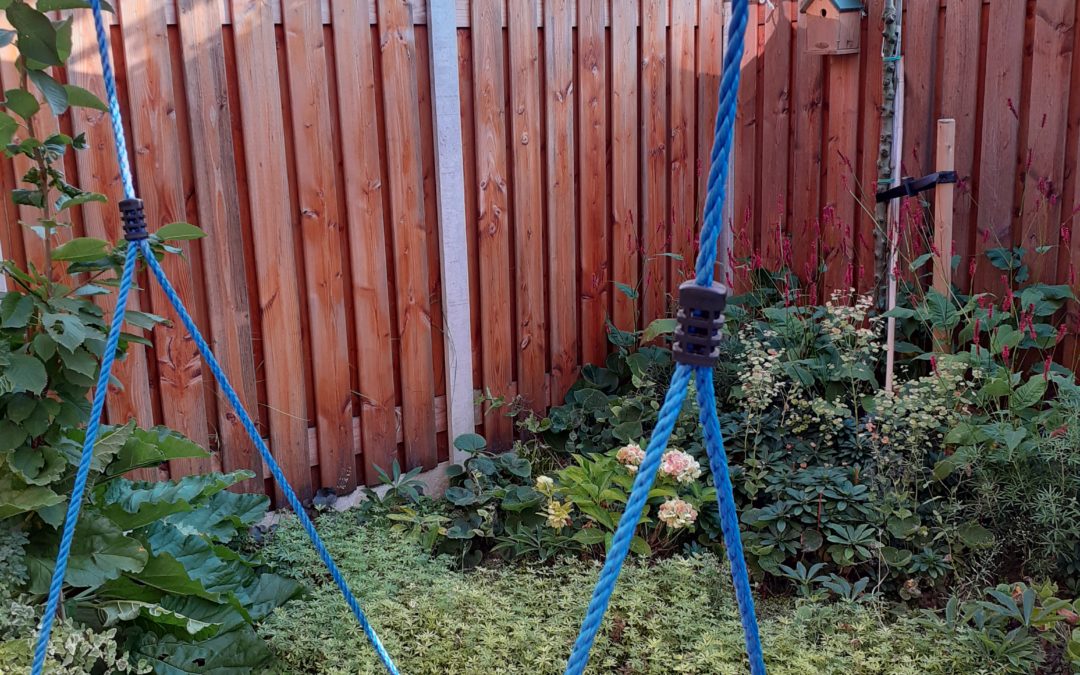Hot weather
This week in Eindhoven it is more than 35 degrees Celsius during the days, and above 20 degrees at night. We even slept in our back garden this week, just to cool down a bit. Which worked! Although it’s too hot to be in the garden in the afternoons, I still love it to have one. The plants will cool down the land by a few degrees, which is very welcome at this moment. Using shade cloth helps too. And still, there is so much blooming. In this blog, you find more information on gardening in the Netherlands and our own experiences.
Gardening in the Netherlands
Gardens have a long tradition here. In the Middle Ages, the monks maintained gardens as they collected medicinal plants. In the centuries that followed there has been a lot of influence from France, England, Italy and Germany. But it was a long time only for the rich, the poor used their land to produce food for their families.
Still, you can see a lot of historical gardens in the Netherlands, for example, kasteeltuin Arcen (only a 40 minutes drive from Eindhoven). A typical Dutch garden doesn’t exist. Nowadays, you can find types of garden from all over the world here. Especially in little villages with large plots of land around the houses, a lot of attention is paid to the gardens. Of course, you will find also a lot of gardens full of tiles.
Our story
In previous posts, you can read about our story of buying a house and make it our own. But we didn’t mention the garden.
The garden was a whole project itself.
We love gardening and even have an extra vegetable garden. Seeing flowers and vegetables grow, leaves colouring in the autumn, seeds transform into plants is really satisfying. When we decided to buy a house, there was something on our wish list: a large back garden. And it still is. Not every dream can come true at the same time. And extra square meters of land will cost you a lot nowadays. But in my mind, I was already planning the garden. And it took a lot of thinking time.
When we got the key the garden existed of ground only, no hedges, no plants, no tiles. Together with our new neighbours, we decided what kind of fence there would be and which company would place that. After that, we started to rethink our plans again.
When you finally stand in your garden, you see different things. You notice how the sun is shining in that specifically season, how the ground is absorbing water (in our case it didn’t), how large the garden really is and what type of ground there is already. All the things you want to know before changing, or making the garden.
Planning
We made a plan for the pavement, bought the tiles and hire someone to lay them and improve the ground. The colours of the house are represented in the colours of the stones. For the shade, we bought a pergola, with the special cloth in it, and placed it above the terrace. One thing we found difficult was deciding which plants are the best for our garden.
We finally decided to buy a packet full of plants which are suitable for the ground type we have and also for the sun/ shadow. The advantage is that during the spring, summer and autumn there are always flowers. That worked out well. The herbs are just in front of the kitchen door, which is very practical. We made a wooden bench, which is at the same time a place where kids can play with sand. A gardener can of course help you with that too, but we didn’t have the budget for that and planted all the plants ourselves.
Garden preparation
To make a plan for your garden, you can think about these things:
– Visiting other gardens.
– What is the current situation? What do you want to keep?
– Your dreams
– How long is the sun shining in the garden?
– Type of ground. Clay, sand or a mix?
– How much time do I want to spend maintaining the garden? For example, grass can be a lot of work (mowing, watering). While there are a lot of plants that doesn’t need so much maintenance.
– Place to play, if you have children.
– Budget.
– What are the best dimensions for a terrace.
– Passageways.
– Shed.
– Raining water, where will it go?
The last question can be very important. You don’t want to have water in your house when it’s raining cats and dogs. The intensity of rain is increasing due to climate change. When you only have tiles in your garden, you might have a problem to solve later on. Some municipalities even subsidize some costs when you remove your tiles and replace them with plants. They think that by doing this, rainwater is kept better in the garden, the garden is less warm in the summer and so, the city or village is cooling down.
Plants also help to keep the ground moist, but some plants are growing better on a particular soil. For advice, you can always ask your local garden centre or even do a course on gardening in the Netherlands if you want to learn more.
Challenges to phase when gardening in the Netherlands
In 2011, when we lived in a flat, we missed the garden very much. And, we decided that it was time for a vegetable garden. We rent a plot of land of 200m2 and started very delightful with gardening. It was in the spring. The sun shined, and we thought: we can do it.
We sow a lot of vegetables and the weeds began to grow too. Also, it was a very dry year, so we started to water the plants. The weeds were getting big, but we didn’t know which plant was a weed and which was the actual vegetable. In the end, with hard work, it took us many Saturdays to get some control back. The harvest was not as we expected, but we did it! And, we learned so much that year. I can tell you a whole other story about rabbits and mice.
I am telling you this story because gardening in the Netherlands looks so easy, however it is not. You will learn most of your mistakes. Start easy and try every year something new. In the end, you will have a beautiful garden.
Conclusion
As an ex-pat, it can be difficult to know what all the possibilities are for gardening in the Netherlands. Almost everything is possible, but think before you do. Look around and visit other gardens.
If you want help with searching for budget-friendly possibilities for your garden, feel free to send an e-mail. We love to help you.




i have lived here a ling time. i cannot get used to neighbours telling me or eachother what (not) to do in their gardens. it is so unfree
i find it very rude i would never tell a neighbour to cut a tree oor whatever. i respect their eir privacy. But they calmly tell me
Hi Kathy,
I can completely understand that you find it rude. As in other cultures, this is maybe something you never do. However, when you have limited space, you may also want some sunshine in your garden. A tree doesn’t limit its space to one garden. That’s why the neighbours ask each other to cut the trees. This is actually a good sign, they try to keep the relationship well by just asking instead of complaining.
Hi, am Indian and gardening is not new to me. It was a whole diff However, as an expat, I need help in what to plant, when to plant and how to care during different seasons. We have recently moved to a new house with a small garden.. Can you help?
Yes, I can. I will send you a private e-mail with more information.
Hi, I am new to Netherlands, moved from India. Tried to grow some plants last summer but didn’t work out, need your guidance on what to be taken care and what to grow at what time
You can grow a lot of plants in the Netherlands. In spring, it is time to fertilize the ground. And, you can still plant (fruit), summer bulbs like dahlia’s, herbs and much more. After the 15th of may, you can plant tomatoes, peppers, zucchini, beans and annual flowers. They die when it starts to freeze. Of course, they should be provided with some fertilizer and be watered when it’s not raining enough.
In the garden shop, you usually find plants for the time of year. You can visit is once in a while and ask for some advice. Also, your local grower can give you advice. As, they have a lot of experience with what works well on the ground type you are dealing with.
Good luck!
Hello Marijke,
I would like to start gardening as a hobby. I don’t know anything about it. I have a small balcony attached to my house and I’m thinking of planting here. Could you help me on what plants to grow in which season and the other relevant information?
Hi Ramya,
A balcony is a great start, especially when it’s on the south or southwest. The amount of sun hours count. When it’s more than 6 hours a day in summer, it is enough for planting vegetables and flowers in pots. I recommend you to buy large pots, they can contain more water and have a better microclimate for plants. Plants in small pots need at least watering once a day when the sun shines in summer.
Also, herbs like rosemary, parsley, coriander, mint and thyme are easy to grow in pots. Annual flowers like marigolds can be a good option too. The time for sowing/planting these plants starts from half of April. You can mix them with perennial plants like ivy.
When your balcony has more shade, you can still make it greener. Just look for plants which have green leaves all year long. Rhododendron, ivy and boxwood are easy plants to start with.
My tip for you would be: start gradually. You can visit the garden centre now and then, to see what’s in season. And build, from there. Good luck!
Hi I moved to a places called Losweg, Geldrop and I am new to Netherlands. My 70 year old neighbour says it’s not safe to grow veggies at my backyard soil as there was a bike factory long back. I would like to know is it safe to plant vegetables at my backyard? I find buying a garden bed and setup is too pricey not cheap.
Hi Bavithra,
Thank you for your question.
There are several ways to check this.
1. Check bodemloket.nl, they collect information about the soil.
2. You can check the condition of the soil, by sending a sample to a specialized laboratory.
3. Call the municipality.
In this case, I would suggest taking the concern of your neighbour serious. You don’t want to harm your health.
For garden beds, you may need a large quantity of compost/ soil. There are companies who sell this in bulk, which is way cheaper than the bags of soil out of the garden centre. Also, building them yourself from recycled materials may be an option.
I hope this will help you on your way. If not, just let me know.
With kind regards, Marijke